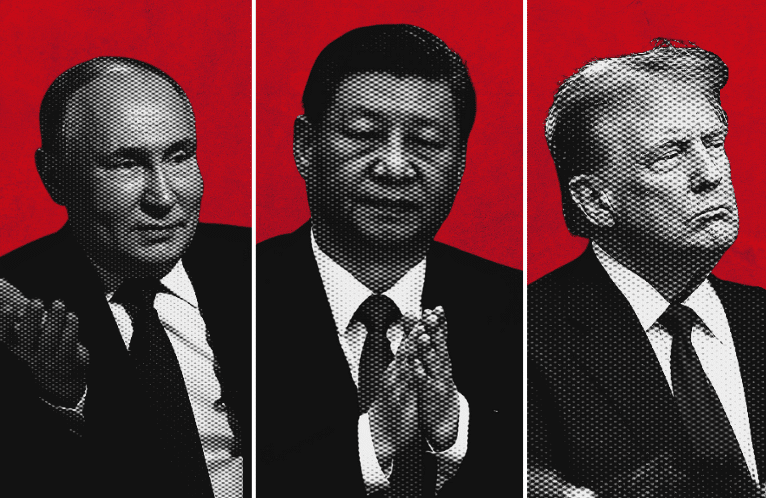Socialism’s Trillion Dollar Chinese Characteristic w/ Zoe Liu
Xiang Songzuo: Our Fundamental Problem is Not China-U.S. Relations

(The following article was translated from Chinese. The original article can be found here. The author is XIANG Songzuo, who is currently the Deputy Director and Senior Fellow of the Center for International Monetary Research at Renmin University of China, member of the advisory board of the Official Monetary and Financial Institutions Forum (OMFIF), and special researcher of the Minsheng Research Institute of China.)
I think that Chinese people in academia, government, and media should not place too much emphasis on participating in discussions on China-U.S. relations. Instead, it is relatively more important to refrain from blindly following the instincts of the crowd. Unlike the crowd, we should not dwell on the prospects of if China and America are on diverging pathways, if China challenges America, if the Chinese currency challenges the supremacy of the U.S. dollar, if China is replacing the U.S. in global leadership, if America is in decline, if the 21st century will be China’s century, or if China has already arrived at the center of the world stage.
For the moment, it cannot be argued that China is considerably behind the U.S. in many areas. Notably, many of the domestic problems Chinese people are faced with have dangerously reached the brink. Even if China as a whole surpassed the U.S. someday, we should still not publicly flaunt that new position. In fact, we should not even lavish praise on ourselves.
Whether or not China has become a global leader, whether China has stood at the center of world stage, or whether China is guiding the world toward progress, it shall be decided by world citizens and tested by human history. China’s aspirations will be based on the reality of a new international order, implemented through a series of specific pragmatic policies, and guaranteed with a newly-structured system of global governance. This is not about exaggerating China’s advantages, waging rhetorical warfare against established discourses, nor embellishing its position in an overconfident manner, which can only result in adverse effects.
Today, American policy toward China has reverted to its previous hostile outlook. It would be unwise to deny that a certain group of Chinese scholars, journalists, and even officials are at least partially responsible for the prevailing winds that are stirring up nationalist sentiment. This is not wise. The optimal policy for today’s China is to continue to get along peacefully with and learn from the U.S.—and vice versa. But I’m afraid that maybe China has more to learn from the U.S.
Chinese media and some scholars have no reservations when they say that America is in decline and that China is already at the center of the world stage, which is bound to invite trouble and make enemies for China. Such conduct and statements are irresponsible.
We should look at the example of America. By the end of the 19th century, the U.S. had already become an economic, manufacturing, technological, and industrial superpower. But the U.S. did not lead the world to establish the international order until after World War II. That is to say, the U.S. waited more than 50 years after it had become an economic superpower before she led and guided the world. Of course, the two world wars gave an opportunity for the U.S. that only comes around once in a blue moon. By seizing these two opportunities, American elites demonstrated strategic thinking.
Americans won the two world wars, then won the Cold War against the Soviet Union. They did not rely on showy rhetorical boasting, but on actual scientific advantage, military prowess, and economic strength, all of which was backed by her unique political system. In particular, American constitutional rule of law rendered enormous advantages.
The superiority of the American cultural and educational values is not simply a product of rhetorical bragging. Today, many Chinese elites are still sending their own kids to the U.S. to attend school. Doesn’t this fact speak for itself?
Belonging to the Chinese nation, I look forward to the day when Chinese culture can shine brightly around the world and the Chinese nation finally makes its great rejuvenation. This is a natural feeling. However, in all fairness, unlike what some so-called scholars and journalists claim, China is still no match to the U.S. in many ways.
When you go outside major Chinese cities, like Beijing, Shanghai, or Guangzhou, to see the vast Chinese countryside or simply go to visit Beijing’s outskirts, go see migrant workers working 10 hours a day, 6 days per week, go see migrant children who don’t have access to urban schools, hospitals, and other public services, go see rural families who are so poor that they have nothing but the four walls that surround them, and take another deep look at the medical and educational conditions of these people.
Our fundamental problem is not China-U.S. relations. Our fundamental goal is not to replace the U.S. as a world leader, much less to call for the toppling of American power. Our fundamental goal is to take care of the over one billion Chinese people by teaching the young, attending to the sick, and taking care of the elderly. For this reason, I sincerely suggest that our scholars, media, and officials should begin to prioritize reason and objectivity above all else. We should refrain from flaunting our will to avoid giving even more trouble to our state, nation, and posterity.









